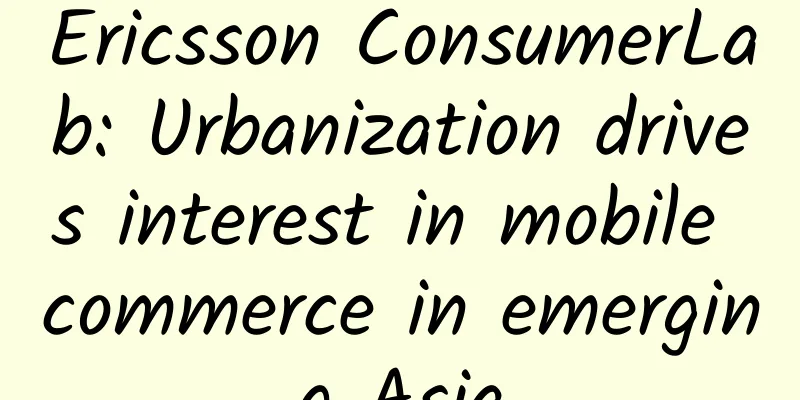Ericsson ConsumerLab: Urbanization drives interest in mobile commerce in emerging Asia

|
* New research from Ericsson ConsumerLab shows that urbanization is driving interest in mobile commerce services, such as receiving and paying money via mobile phones, in emerging Asia * When it comes to financial matters, the “circle of trust” formed by family and friends is very important and will influence how consumers accept mobile financial services * Security concerns and convenience will drive adoption of cashless payments and mobile commerce services A new report from Ericsson Consumer Lab explores the likelihood of widespread adoption of mobile commerce in emerging Asia, including Bangladesh, Indonesia and Vietnam. The findings show that 54% of respondents in Indonesia (the most developed economy in the study) have used money transfer services (to receive/spend money), followed by Vietnam (45%) and Bangladesh (34%). When it comes to using mobile devices for mobile money transfer services, there are significant differences in awareness and interest across markets. To take an extreme example, in Bangladesh, 97% of people are interested in the service and 100% are aware of it, mainly due to the bKash money transfer service being a household name in Bangladesh. In Indonesia, 49% of people are interested in mobile money transfer services and 35% are aware of them. In Vietnam, the corresponding figures are 26% and 19%, respectively. So how many people have actually used mobile money transfer services? The survey results show that the usage rate is low: only 4% of people in Bangladesh have used it, while in Indonesia and Vietnam it is 1%. An important finding of this study is that the urbanization process has led many people to migrate to cities for employment, stimulating society's demand for fast and reliable money transfers. "This is due to the fact that while some family members have moved to the city, many remain in the countryside and are still dependent on the family members who have moved to the city, especially when it comes to finances," says Patrik Hedlund, Senior Advisor at Ericsson ConsumerLab. "In these developing markets, overall incomes are generally lower, so there is a need to speed up the process of receiving and paying money." The markets studied are still largely cash economies, where cash is the mainstay of everyday transactions. Ericsson ConsumerLab found that these economies are characterised by “circles of trust” – groups of family, friends or neighbours who often pool their money and lend it to one another if needed. However, people in a cash-based society have many concerns when it comes to security, such as getting the wrong change when buying something or receiving counterfeit money. Another drawback is the lack of convenience. Often, you need to make an appointment to wait at home for the debt collector to collect the debt, or you must go to a specific business location during specific business hours to complete the relevant procedures. As a result, up to 78% of Bangladeshi consumers and 57% of Indonesian consumers are interested in using mobile payment methods to pay service bills. In Vietnam, the figure is 37%. In short, emerging Asian markets are enthusiastic about mobile financial services, especially mobile money transfer and bill payment services. |
<<: Drink Astragalus soup regularly to prevent diseases and maintain health
>>: Leverage social media to build expertise
Recommend
How big is the fetus at 22 weeks of pregnancy
Witnessing the growth of their children day by da...
Menstrual discharge is like rotten meat pictures
Nowadays, the lifestyle of many girls is not very...
What to do if pregnant women have stomach pain in late pregnancy
Pregnant women are a group that we need to pay at...
Symptoms of early pregnancy one week leucorrhea
Women usually have a lot of leucorrhea in the ear...
Treatment of irregular menstruation and constipation
The problem of menstruation is a nasty problem th...
Cervical cancer stage III
Of course, for a disease like cervical cancer, th...
Blood clots discharged from the body after abortion
Abortion is a way of performing miscarriage throu...
Can I eat cauliflower during my period?
Cauliflower is not cauliflower, but some friends ...
I still have urine leakage three years after giving birth.
Many women will experience physical changes after...
Which medicine is best for fungal vaginitis
Vaginal candidiasis is a common gynecological dis...
How to do breast ductoscopy
Breast ductoscopy is a method of checking for wid...
This is the principle of scraping. I just found out about it today!
Gua Sha is a common natural therapy in Traditiona...
Can I still have sex after taking birth control pills?
When having sex, contraception is usually what ev...
Why do girls feel nothing when they have sex?
Love is a euphemism for sex in life. It is a beha...
What should pregnant women eat when they have toothache?
There are many factors that cause toothache. The ...









